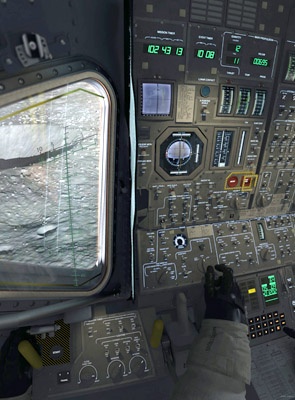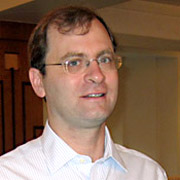Spotlight | Science, Technology and Society
AIAA honors David Mindell for Digital Apollo
The American Institute of Aeronautics and Astronautics (AIAA) has named MIT historian David A. Mindell the winner of its Gardner-Lasser Aerospace History Literature Award for his book Digital Apollo: Human and Machine in Spaceflight.
“It is wonderful to see David's book receive this important and well-deserved recognition,” said David Kaiser, Germeshausen Professor of the History of Science and head of the School of Humanities, Arts, and Social Science’s Program in Science, Technology, and Society (STS).
The award recognizes the best original contribution to the field of aeronautical and astronautical nonfiction literature that was published in the last five years and deals with the science, technology, and/or the impact of aeronautics or astronautics on society.
“It's a great honor for Digital Apollo to be recognized by one's peers in the AIAA,” said Mindell, the Frances and David Dibner Professor of the History of Engineering and Manufacturing in STS. “To my unending delight, this book has really struck a chord with people from all over the world of technology who see how the issues that arose in the Apollo landings were harbingers of those cropping up in today's remote and autonomous systems."
Humans and machines
Digital Apollo, which was published by MIT Press in 2011, explores the relationship between humans and computers during the Apollo space program, which launched six manned lunar landings and many other spaceflights between 1963 and 1972. In each of the six Apollo landings, the astronaut in command seized control from the computer and landed with his hand on the stick in a fly-by-wire mode. Mindell recounts the story of astronauts' desire to control their spacecraft in parallel with the history of the Apollo Guidance Computer, which was designed at MIT.
“As in much of David Mindell's superb historical work, Digital Apollo zeroes in on the complicated interplay between humans and machines. He wrests deep meaning from the mundane artifacts of engineering,” Kaiser said. “Blueprints, circuit diagrams, and technical reports reveal, in David's skilled hands, a wider world of designers, users, and their evolving aspirations.”
Mindell, who is also a Professor of Aeronautics and Astronautics at MIT will receive the award on January 8, 2013 at a ceremony held in conjunction with the 51st AIAA Aerospace Sciences Meeting in Grapevine, Texas.
Suggested Links
David Mindell website
Digital Apollo website
MIT Press | About Digital Apollo
3 Questions: David Mindell on Obama’s NASA proposal
MIT space researcher predicts that if adopted, Obama’s proposed budget and policy will lead to more joint human-robotic space exploration
A new vision for people in space
Report outlines goals for future of human space program

"Digital Apollo is an excellent and unique historical account of the lengthy and often pitched struggle of designers, engineers, and pilots to successfully integrate man and complex computer systems for the Apollo lunar landings. It brings back fond memories."
— Capt. Edgar Mitchell, Sc.D. ’64, USN (ret.)
Lunar Module Pilot, Apollo 14

Digital Apollo
Human and Machine in Spaceflight
David A. Mindell
MIT Press, 2008, 2011